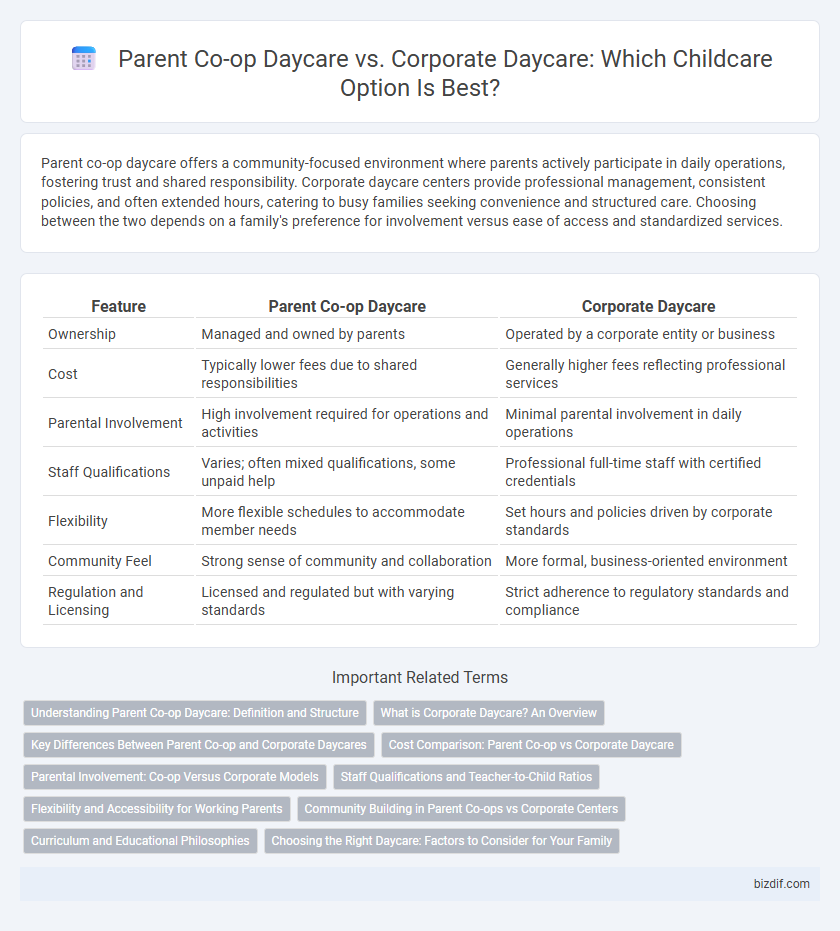Parent co-op daycare offers a community-focused environment where parents actively participate in daily operations, fostering trust and shared responsibility. Corporate daycare centers provide professional management, consistent policies, and often extended hours, catering to busy families seeking convenience and structured care. Choosing between the two depends on a family's preference for involvement versus ease of access and standardized services.
Table of Comparison
| Feature | Parent Co-op Daycare | Corporate Daycare |
|---|---|---|
| Ownership | Managed and owned by parents | Operated by a corporate entity or business |
| Cost | Typically lower fees due to shared responsibilities | Generally higher fees reflecting professional services |
| Parental Involvement | High involvement required for operations and activities | Minimal parental involvement in daily operations |
| Staff Qualifications | Varies; often mixed qualifications, some unpaid help | Professional full-time staff with certified credentials |
| Flexibility | More flexible schedules to accommodate member needs | Set hours and policies driven by corporate standards |
| Community Feel | Strong sense of community and collaboration | More formal, business-oriented environment |
| Regulation and Licensing | Licensed and regulated but with varying standards | Strict adherence to regulatory standards and compliance |
Understanding Parent Co-op Daycare: Definition and Structure
Parent co-op daycare is a community-driven childcare model where parents collaboratively manage and operate the facility, sharing responsibilities such as caregiving, administration, and decision-making. This structure fosters a strong sense of involvement, affordability, and personalized care by leveraging parental participation rather than relying solely on paid staff. Typically organized as a cooperative, it emphasizes shared values, trust, and active collaboration to create a nurturing environment tailored to children's needs.
What is Corporate Daycare? An Overview
Corporate daycare refers to child care centers established and operated by companies to support their employees by providing convenient, on-site or nearby child care services. These facilities often feature structured programs with professional staff, adherence to regulatory standards, and integration with employee benefits, enhancing work-life balance and productivity. By investing in corporate daycare, organizations aim to reduce absenteeism and turnover while fostering a family-friendly workplace culture.
Key Differences Between Parent Co-op and Corporate Daycares
Parent co-op daycares emphasize active parent involvement, fostering a community-driven approach where parents share responsibilities in daily operations and decision-making. Corporate daycares operate as professional businesses with paid staff, offering structured programs and standardized care without requiring parental participation. Key differences include governance models, cost structures, and levels of parent engagement, impacting the overall experience and sense of community for families.
Cost Comparison: Parent Co-op vs Corporate Daycare
Parent co-op daycares typically offer lower tuition fees because parents contribute time and labor, reducing staffing and operational costs. Corporate daycares charge higher fees to cover professional staff salaries, administrative expenses, and state-of-the-art facilities. Families seeking affordable childcare often prefer parent co-op models for cost savings, while corporate daycares provide convenience with full-service programs.
Parental Involvement: Co-op Versus Corporate Models
Parent co-op daycares emphasize high parental involvement, requiring families to actively participate in daily operations and decision-making processes, fostering a strong sense of community and collaboration. In contrast, corporate daycares typically minimize parental roles, relying on professional staff to manage activities and administration, which can limit direct parental engagement. This fundamental difference impacts the overall experience, with co-op models promoting hands-on family interaction and corporate models offering convenience and standardized care.
Staff Qualifications and Teacher-to-Child Ratios
Parent Co-op daycares often feature highly engaged parents with varying levels of childcare experience, fostering a community-driven environment, whereas corporate daycares employ professionally trained staff with standardized certifications in early childhood education. Teacher-to-child ratios in parent co-ops can be more flexible but may lack consistency, while corporate daycares adhere to strict regulatory guidelines, typically maintaining ratios such as 1:4 for infants and 1:10 for preschoolers to ensure safety and personalized attention. These differences significantly impact the quality of supervision and educational outcomes in each daycare model.
Flexibility and Accessibility for Working Parents
Parent co-op daycares offer greater flexibility and accessibility for working parents by allowing them to participate in scheduling and caregiving duties, often resulting in more personalized care and adaptable hours. Corporate daycares typically provide structured hours aligned with standard work schedules but may lack the flexibility to accommodate irregular or extended work shifts. Working parents seeking a collaborative environment with flexible involvement tend to prefer parent co-op models, while those needing consistent, professional care favor corporate daycare options.
Community Building in Parent Co-ops vs Corporate Centers
Parent co-op daycares foster strong community bonds by involving parents directly in daily operations, creating a collaborative environment that enhances children's social development and parental engagement. Corporate daycare centers often emphasize standardized care with professional staff but may lack the personalized community connection and active parental involvement found in co-ops. This community-centric model in parent co-op daycares supports deeper relationships among families and a shared commitment to the child's growth.
Curriculum and Educational Philosophies
Parent co-op daycares often emphasize play-based and child-centered curricula, fostering community involvement and collaborative learning aligned with developmental milestones. Corporate daycares typically implement standardized, research-based educational philosophies such as Montessori or Reggio Emilia, ensuring consistent programming and professional development for staff. Both models prioritize early childhood cognitive, social, and emotional growth but differ in curriculum flexibility and parental engagement levels.
Choosing the Right Daycare: Factors to Consider for Your Family
Choosing the right daycare involves evaluating key factors such as cost, caregiver-to-child ratio, and the daycare's philosophy. Parent co-op daycares often promote community involvement and lower fees but require active parent participation, while corporate daycares provide professional staff and streamlined operations with standardized curricula. Families should consider their availability, budget, and preferred learning environment to determine the best fit for their child's development and well-being.
Parent Co-op Daycare vs Corporate Daycare Infographic

 bizdif.com
bizdif.com